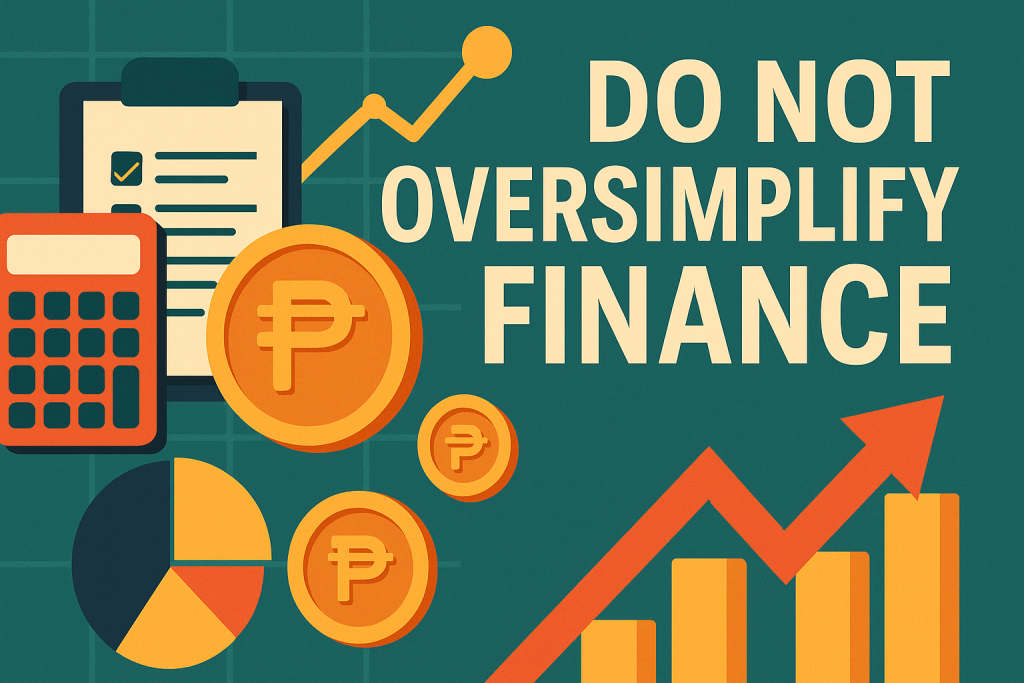Why Oversimplifying Personal Finance Is a Bad Idea
By Randell Tiongson on June 23rd, 2025
In today’s social media-driven world, financial advice often gets reduced to catchy one-liners:
“Just invest.”
“Just buy insurance.”
“Just stop spending on coffee.”
“Just follow this budgeting app.”
It sounds good, but here’s the problem:
Oversimplifying personal finance is not just unhelpful—it can be harmful.
Over the years, I’ve taught countless seminars, walked with families through financial crises, mentored OFWs, and equipped young professionals. If there’s one thing I’ve learned, it’s this:
Personal finance is not about shortcuts. It’s about stewardship.

Personal Finance is a Process, Not a One-Liner
That’s why I created my No Nonsense Personal Finance framework—not to make things complicated, but to make them intentional.
Here’s the step-by-step structure I teach:
- Understand your cash flow
- Manage your debt wisely
- Build your emergency fund
- Get insurance
- Invest for your future
- Plan your estate (a newly added sixth step in my 2025 edition)
Each step serves a distinct purpose. Skipping ahead may feel efficient, but in reality, it exposes gaps that can cause major setbacks. For instance, you can’t invest wisely if you’re buried in unmanageable debt or don’t have an emergency fund.
Personal finance isn’t about getting rich quick. It’s about building strong foundations and being faithful with what we’ve been given. Remember, we build wealth one peso at a time.
Most Financial Mistakes Are Behavioral, Not Mathematical
Let’s be honest—most money problems aren’t due to a lack of technical knowledge. They’re rooted in behavior.
We procrastinate. We give in to lifestyle pressure. We panic during market dips.
We chase trends instead of pursuing truth.
This is where behavioral finance plays a huge role. The way we think about money—our emotions, biases, and habits—shapes our outcomes far more than formulas or tools.
“The plans of the diligent lead surely to abundance, but everyone who is hasty comes only to poverty.”
— Proverbs 21:5 (ESV)
It takes discipline and wisdom to stay the course. And oversimplified advice doesn’t shape behavior—it only masks deeper issues.
Understanding Financial Instruments Matter
Here’s another risk of oversimplification: people invest in what they don’t fully understand.
I’ve seen too many Filipinos buy products they barely grasp—from variable life policies to high-risk stocks, NFTs, or “guaranteed” crypto yields. Oversimplified marketing leads to underinformed decisions.
Understanding how financial instruments, markets, and economics work is essential to long-term success and protection. We don’t need everyone to become economists—but we do need financial literacy rooted in reality, not hype.
Personal Finance is a Form of Stewardship
For me, personal finance isn’t just a technical discipline—it’s a spiritual one.
As stewards, we are not owners. We manage what has been entrusted to us.
“Moreover, it is required of stewards that they be found faithful.”
— 1 Corinthians 4:2 (ESV)
That means:
- Being diligent in the small things
- Avoiding get-rich-quick thinking
- Planning wisely, living humbly
- Using our resources to bless others and advance good
Oversimplification short-circuits stewardship. It makes us passive instead of purposeful.
My Thoughts
We don’t need more viral advice.
We need more faithful action.
We need more wise, long-term thinking.
We need more disciplined stewardship.
If you want to take control of your financial life, don’t settle for gimmicks. Embrace the process. Learn. Ask questions. Walk step-by-step.
Because your financial life is too important to leave to chance—or trends.
Let’s do it the no-nonsense way. Let’s do it the wise way.


Where can we buy the book and how much?